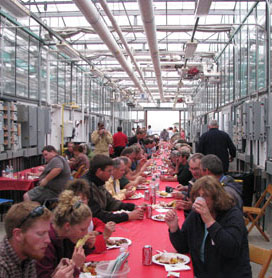Round up of recent news items …
- “They’re no longer farming in a static environment,” says David Wolfe (right) in an article in a Sept. 4 story about the effects of climate change on farming in the Raleigh News & Observer (Farmers Warned to Get Ready). “They can’t rely on the calendar to tell them when to plant, they can’t rely on the variety of seeds they have always used, and they can’t rely on dealing with the same insect pests, because it’s all a moving target now.”
- A forbidden fruit stages a comeback – Cornell Alumni Magazine chronicles the return of black currants, a crop on hiatus for years after being deemed a public nuisance in 1911.
“The federal ban—a legacy of the timber lobby’s muscle amidst a turn-of-the-century building boom—was lifted in 1966, but New York State kept its own on the books until 2003, when a campaign by Hudson Valley farmer and Cornell extension agent Steven McKay brought science to bear. ‘The market value of Ribes in New York State could be higher than the whole pine timber industry,’ says McKay, who notes that today, rust-immune cultivars and improved management techniques substantially mitigate risk. ‘Not that we don’t need lumber,’ he says, ‘but there are places for Ribes and places for pines.'”
- CALS clicks – eCALSconnect features Plant Science Day at the Long Island Horticultural Research and Extension Center (LIHREC) in Riverhead, N.Y. (right), Art of Horticulture class’s sod sofa, and the Organic Twilight Tour at Freeville in its monthly photo gallery.
- New Cornell lab in Portland, N.Y., specializes in vines, wines – “Cornell deepened its century-long commitment to western New York’s wine, grape and juice industries when it officially opened its new $5.4 million Cornell Lake Erie Research and Extension Laboratory (CLEREL) in Portland, N.Y., Aug. 25,” according to a Cornell Chronicle article.




